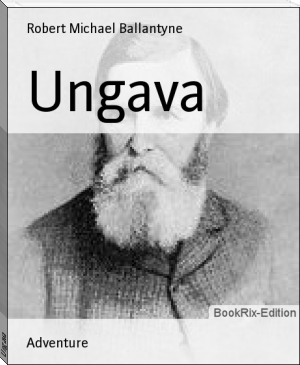Ungava - Robert Michael Ballantyne (distant reading txt) 📗

- Author: Robert Michael Ballantyne
Book online «Ungava - Robert Michael Ballantyne (distant reading txt) 📗». Author Robert Michael Ballantyne
Having made all her arrangements, Edith glided noiselessly from the hut, harnessed her dog, closed the door of the snow-hut, and jumping into the furs of her sledge, was soon far away from the mountain lake. At first the dog followed what she thought must be the track that Maximus had taken, and her spirits rose when, after an hour's drive, she emerged upon a boundless plain, which she imagined must be the shores of the frozen sea where the Esquimaux lived. Encouraging Chimo with her voice, she flew over the level surface of the hard frozen snow, and looked round eagerly in all directions for the expected signs of natives.
But no such signs appeared, and she began to fear that the distance was greater than she had anticipated. Towards the afternoon it began to snow heavily. There was no wind, and the snow fell in large flakes, alighting softly and without any sound. This prevented her seeing any great distance, and, what was worse, rendered the ground heavy for travelling.
At length she came to a ridge of rocks, and supposing that she might see to a greater distance from its summit, she got out of the sledge and clambered up, for the ground was too rough for the sledge to pass. Here the view was dreary enough--nothing but plains and hummocks of ice and snow met her view, except in one direction, where she saw, or fancied that she saw, a clump of willows and what appeared to be a hut in the midst of them. Running down the rugged declivity, she crossed the plain and reached the spot; but although the willows were there, she found no hut. Overcome with fatigue, fear, and disappointment, she sat down on a wreath of snow and wept. But she felt that her situation was much too serious to permit of her wasting time in vain regrets, so she started up and endeavoured to retrace her steps. This, however, was now a matter of difficulty. The snow fell so thickly that her footsteps were almost obliterated, and she could not see ten yards before her. After wandering about for a few minutes in uncertainty, she called aloud to Chimo, hoping to hear his bark in reply. But all was silent.
Chimo was not, indeed, unfaithful. He heard the cry and responded to it in the usual way, by bounding in the direction whence it came. His progress, however, was suddenly arrested by the sledge, which caught upon and was jammed amongst the rocks. Fiercely did Chimo strain and bound, but the harness was tough and the sledge immovable. Meanwhile the wind arose, and although it blew gently, it was sufficient to prevent Edith overhearing the whining cries of her dog. For a time the child lost all self-command, and rushed about she knew not whither, in the anxious desire to find her sledge; then she stopped, and restrained the pantings of her breath, while with both hands pressed tightly over her heart, as if she would fain stop the rapid throbbing there, she listened long and intently. But no sound fell upon her ear except the sighing of the cold breeze as it swept by, and no sight met her anxious gaze save the thickly falling snow-flakes.
Sinking on her knees, Edith buried her face in her hands and gave full vent to the pent-up emotions of her soul, as the conviction was at length forced upon her mind that she was a lost wanderer in the midst of that cold and dreary waste of snow.
CHAPTER TWENTY NINE.
A DARK CLOUD OF SORROW ENVELOPS FORT CHIMO.
Three days after the events narrated in the last chapter the fort of the fur-traders became a place of weeping; for on the morning of that day Maximus arrived with the prostrate form of Frank Morton, whom he had discovered alone in the igloo on the lake, and with the dreadful news that little Edith Stanley was nowhere to be found!
It may be more easily imagined than described the state of mind into which the parents of the child were thrown; but after the first burst of emotion was past, Stanley felt that a thorough and immediate search was the only hope that remained to him of finding his little one alive. Still, when he considered the intensity of the cold to which she must have been exposed, and the length of time which had already elapsed since she was missed, his heart sank, and he could scarcely frame words of comfort to his prostrated partner. Maximus had examined the immediate neighbourhood of the lake, in the hope of finding the tracks of the lost one; but a heavy fall of snow had totally obliterated these, and he wisely judged that it would be better to convey the sick man to the fort as quickly as possible and give the alarm, so that parties might be sent out to scour the country in all directions.
Frank was immediately put to bed on his arrival, and everything done in order to restore him. In this attempt they succeeded so far as to obtain all the information he could give concerning his fall; but he remembered nothing further than that Edith had been the means of bringing him to the snow-hut, where he lay in a deep, torpid slumber, until the voice and hand of Maximus awakened him. When Frank was told that Edith was lost, he sprang from his bed as if he had received an electric shock. The confusion of his faculties seemed swept away, and he began to put on his garments with as much vigour as if he were well and strong; but ere he belted on his leather coat his cheek grew pale, his hand trembled, and he fell in a swoon upon the bed. This convinced him of the impossibility of doing anything in the search, and he was prevailed on, after two or three similar failures, to leave the work to others.
Meanwhile the mountains and valleys of Ungava were traversed far and near by the agonised father and his men. The neighbourhood of the lake was the first place searched, and they had not sought long ere they discovered the little sledge sticking fast among the rocks of the sea-coast, and Chimo lying in the traces almost dead with cold and hunger. The dog had kept himself alive by gnawing the deerskin of which the traces were made. Around this spot the search was concentrated, and the Esquimaux of the neighbouring camp were employed in traversing the country in all directions; but, although scarce a foot of ground escaped the eager scrutiny of one or other of the party, not a vestige of Edith was to be seen--not so much as a footprint in the snow.
Days and nights flew by, and still the search was continued. Frank quickly recovered under the affectionate care of the almost heartbroken mother, who found some relief from her crushing sorrow in ministering to his wants. But the instant he could walk without support, and long before it was prudent to do so, Frank joined in the search. At first he could do little, but as day after day passed by his strength returned so rapidly that the only symptoms that remained to tell of his late accident were his pale cheek and the haggard expression of his countenance. But the mysterious disappearance of Edith had more to do with the latter than illness.
Weeks passed away, but still the dark cloud of sorrow hung over Fort Chimo, for the merry young voice that was wont to awake the surrounding echoes was gone. The systematic search had now been given up, for every nook, every glen, and gorge, and corrie within fifteen miles of the spot where they had found the little sledge, had been searched again and again without success. But hope clung with singular tenacity to the parents' hearts long after it had fled from those of the men of the fort and of the Esquimaux. Every alternate day Stanley and Frank sallied forth with heavy steps and furrowed brows to explore more carefully those places where the child was most likely to have strayed, expecting, yet fearing, to find her dead body. But they always returned to the bereaved mother with silent lips and downcast looks.
They frequently conversed together about her, and always in a hopeful tone, each endeavouring to conceal from the other the real state of his own mind. Indeed, except when necessity required it, they seldom spoke on any other subject.
One day Stanley and Frank were seated by the blazing stove in the hall conversing as usual about the plan of the search for that day. Mrs Stanley was busied in preparing breakfast.
"'Tis going to blow hard from the north, Frank," said Stanley, rising and looking out of the window; "I see the icebergs coming into the river with the tide. You will have a cold march, I fear."
Frank made no reply, but rose and approached the window. The view from it was a strange one. During the night a more than usually severe frost had congealed the water of the lake in the centre, and the icebergs that sailed towards the Caniapuscaw River in stately grandeur went crashing through this young ice as if it had been paper, their slow but steady progress receiving no perceptible check from its opposition. Some of these bergs were of great size, and in proceeding onwards they passed so close to the fort that the inhabitants feared more than once that a falling pinnacle might descend on the stores, which were built near to the water's edge, and crush them. As the tide gradually rose it rushed with violence into the cavities beneath the solid ice on the opposite shore, and finding no escape save through a few rents and fissures, sent up columns or spouts of white spray in all directions, which roared and shrieked as they flew upwards, as if the great ocean were maddened with anger at finding a power strong enough to restrain and curb its might. At intervals the main ice rent with a crash like the firing of artillery; and as if nature had designed to carry on and deepen this simile, the shore was lined with heaps of little blocks of ice which the constantly recurring action of the tide





Comments (0)